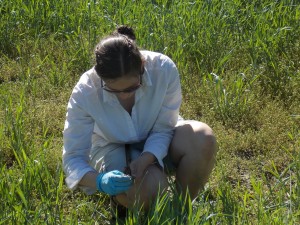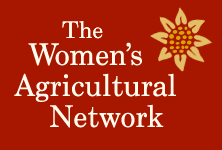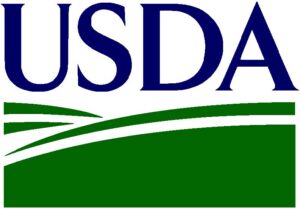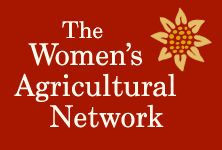Lindsey Ruhl, graduate student at the University of Vermont (UVM) Department of Plant and Soil Science, originally didn’t set out to become a soil scientist. But she now knows the critical links among soil health and local food systems, water quality, and the livelihoods of farmers. And she’s passionate about soil science and its effect on food sovereignty.
Lindsey is a recent recipient of a Northeast Sustainable Agriculture Research and Education program (SARE) graduate student grant. Her project, called “Mitigating and Preventing Flood-Related Soil Quality Degradation Using Cover Crop Blends,” is a response to questions she had about soil health following a natural disaster, in this case Tropical Storm Irene. Lindsey is looking at strategies farmers can use when their fields are faced with “post-flood syndrome,” a variety of soil fertility problems that arise after flooding. In particular, she is investigating different cover crops—winter rye, forage radish, hairy vetch, and lupine—and their abilities to “alleviate post-flood deficiencies in organic vegetable production systems” and rejuvenate soils after a flood event.
Lindsey’s interests in sustainable agriculture were cultivated during her undergraduate work at Evergreen State College where she studied food systems. She said, “I was very interested in how we could increase food sovereignty at the local level and at the global level. And this led me to my next big question: How can we produce more food locally? And, more fundamentally, what helps plants grow?” The answer—the building block of sustainable agriculture—was healthy soil.
She moved to Burlington and joined the field crew at Arethusa Farm, a certified organic vegetable farm at the Intervale. Lindsey said, “I am interested in eventually pursuing policy or extension work, but I felt I first needed some hands-on experience and a solid science background.” Next came her enrollment to the Master of Science program at UVM and the NE-SARE graduate student grant. “I feel the SARE grant got me into graduate school,” she said, “Being funded was key.”

UVM PSS graduate student Lindsey Ruhl takes a break from finals to sample her research plots at the Intervale.
Lindsey said the most important skill she’s gained through her NE-SARE experience has been grant management. “SARE has been great to learn how to manage a grant. I’ve learned how to budget time for both sampling and processing data. And I’ve learned that it can be challenging to coordinate schedules for farmer cooperators, faculty advisors, and myself!” She’s also learning the challenges and rewards that come with conducting applied, field-based research (eg., the spring floods she was expecting for her project just haven’t come this spring!) and the juggling needed to balance school work and field work (especially in the spring when finals—this week!—coincide with good planting weather!)
Perhaps the most rewarding part of her SARE grant has been taking charge of her own research project—a skill she’ll likely use throughout her career. She said, “NE-SARE really gave me the opportunity to design and implement my own research.”
You can learn more about Lindsey’s work through a blog she’s developed called “Flooded Soils.” Applications for the 2013 NE-SARE Graduate Students Grants Program are due soon – May 21, 2013 – see the NE-SARE website for applicant instructions and additional information.







